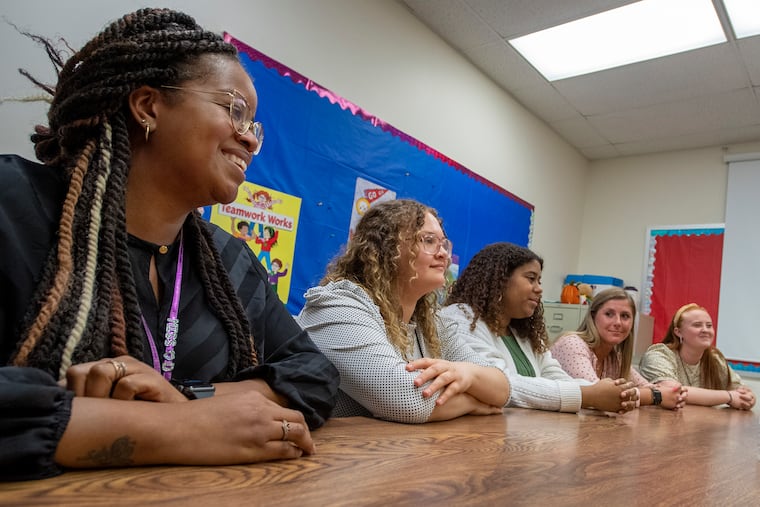Nearly 4,000 student teachers applied for stipends, but Pa. only has money to pay 700
Advocates say Pennsylvania should expand funding for the program to meet the demand — and to combat a shrinking supply of new teachers.

Just 20 minutes after applications opened for Pennsylvania’s new program offering stipends to student teachers, Hannah Buckley logged on and submitted hers. But she isn’t sure whether that was fast enough.
Within two hours last month, officials say more than 3,500 people applied for the new program, which provides student teachers $10,000 stipends. The program offers an additional $5,000 for placements in schools that attract few student teachers or have high vacancy rates.
But there’s only enough funding for 600 to 700 people, said Bethany Coleman, spokesperson for the Pennsylvania Higher Education Assistance Agency. As of Monday, more than 3,900 people had applied for the awards, which will be given out first come, first served, Coleman said.
Advocates say Pennsylvania should expand funding for the program to meet the demand — and to combat a shrinking supply of new teachers. On Tuesday, they’ll be lobbying lawmakers to increase funding for the stipend program from $10 million to $75 million, and to add $10 million for school “grow-your-own” programs that train high schoolers to become teachers.
Without a stipend, Buckley, 21, an aspiring educator who graduated Monday from Shippensburg University, will “100% have to dip into savings” when she begins 16 weeks of student teaching this fall — fulfilling a requirement to become a teacher in Pennsylvania. “It’s a full-time job with no pay,” she said.
That’s a barrier to entry that advocates say shouldn’t exist at a time when Pennsylvania is battling a shortage of qualified teachers.
“We are still in the midst of a pretty dire crisis,” said Laura Boyce, Pennsylvania executive director of Teach Plus, a nonprofit that recently released an analysis finding Pennsylvania needs at least 15,000 more teachers to fill vacant positions and replace those who are leaving the profession or don’t have proper certifications. That’s more than double the number of new teachers being certified in the state each year.
To help create that pool of new educators, Pennsylvania needs to make “really dedicated investments in the teacher pipeline,” including fully meeting demand for the stipend program, said Boyce, who will be among those lobbying for an increase Tuesday.
Leaders of Pennsylvania’s colleges of education have thrown their support behind the lobbying efforts.
Student teachers “should be remunerated for their work, as a matter of fairness and as a signal that we respect and value their contributions,” said Katharine Strunk, dean of the University of Pennsylvania’s Graduate School of Education and an expert on teacher labor markets, who noted the “backdrop of Pennsylvania’s crippling teacher shortages.”
Beth Rementer, a spokesperson for House Democrats, said they were “seriously considering the advocates’ recommendations,” given the demand for the stipends and the need to grow the teaching workforce. A spokesperson for Senate Republicans, who control that chamber, did not respond to a request for comment.
While demand for the stipend program has outstripped available funding, the application window is still open. Some education colleges have told student teachers they should still apply to be in line if funding is increased. Boyce said additional money secured during budget negotiations could go toward existing stipend applications.
Some students are still debating whether to apply because the program requires them to commit to teaching for three years in Pennsylvania. “It’s definitely appealing,” said Zoe Boynton, a 21-year-old Drexel University junior who will be student teaching in Philadelphia in August.
Because Boynton is considering going to graduate school elsewhere, she’s undecided on applying for the stipend — describing the commitment to teaching in Pennsylvania as a “big decision.”
Boynton is passionate about teaching and not considering another career path, she said. But she noted the burden of teaching without pay, while dealing with the anxiety of being assessed by supervisors.
Like other teachers, student teachers often buy supplies lacking from their classrooms, Boynton said.
“It’s a lot of effort for little reward,” Boynton said.
Buckley, the Shippensburg graduate, is also determined to become a teacher. But she worries society doesn’t place enough value on the profession.
“I feel like part of the reason for the teacher shortages is the lack of money in the job for the amount of stuff we actually do, and honestly, the lack of respect people have for teachers,” said Buckley, who will move home to Quakertown this month to work full-time as a lead teacher in a day care before returning to the Shippensburg area this fall to student teach.
Buckley has worked throughout college — including day-care roles and at Chick-fil-A — and has also received scholarship money, which she won’t be able to renew while student teaching.
Even if she doesn’t get a stipend, she hopes the state increases the funding for the sake of future teachers. “They’ll be more passionate, because they’ll be less stressed,” she said.